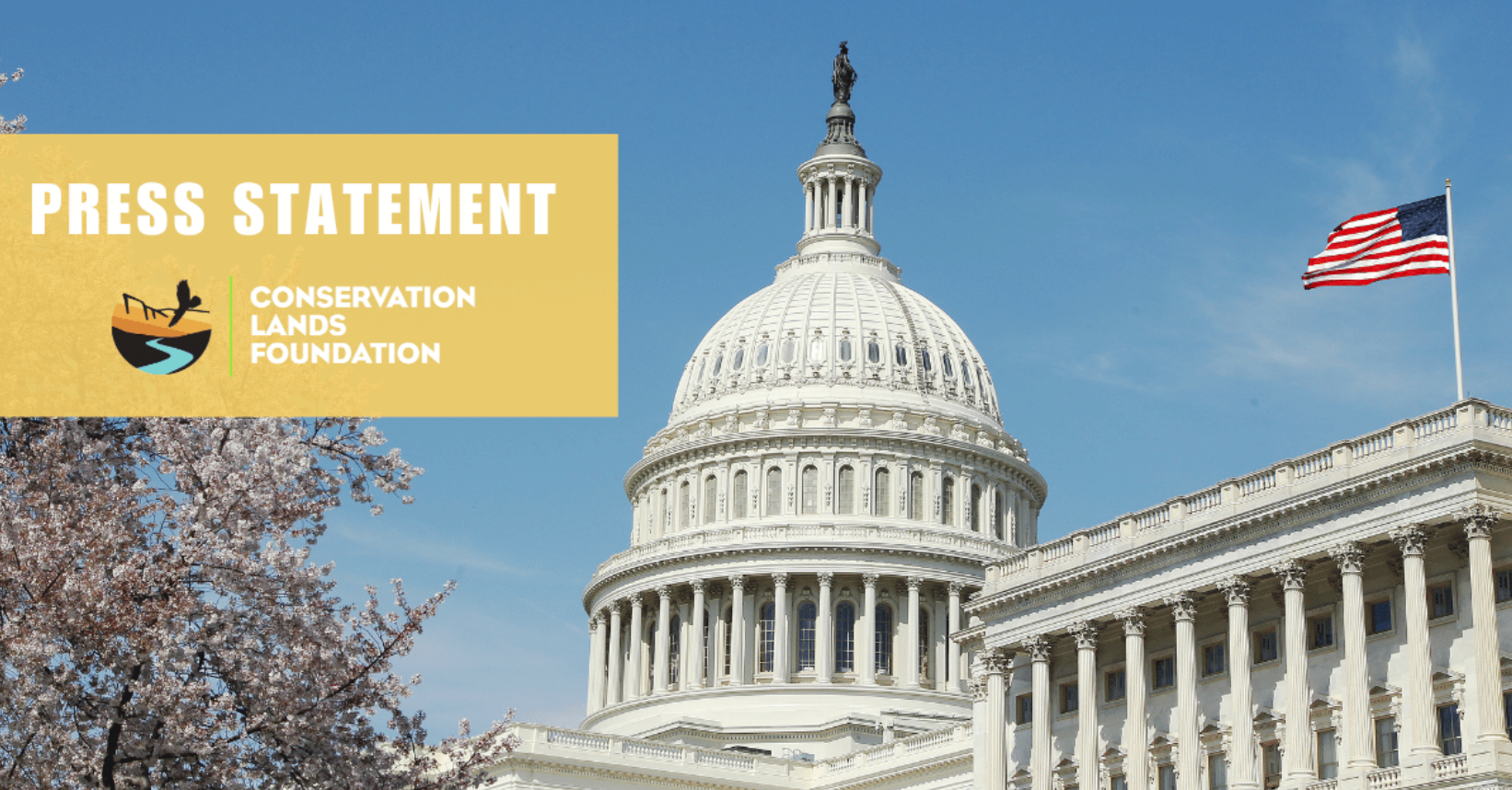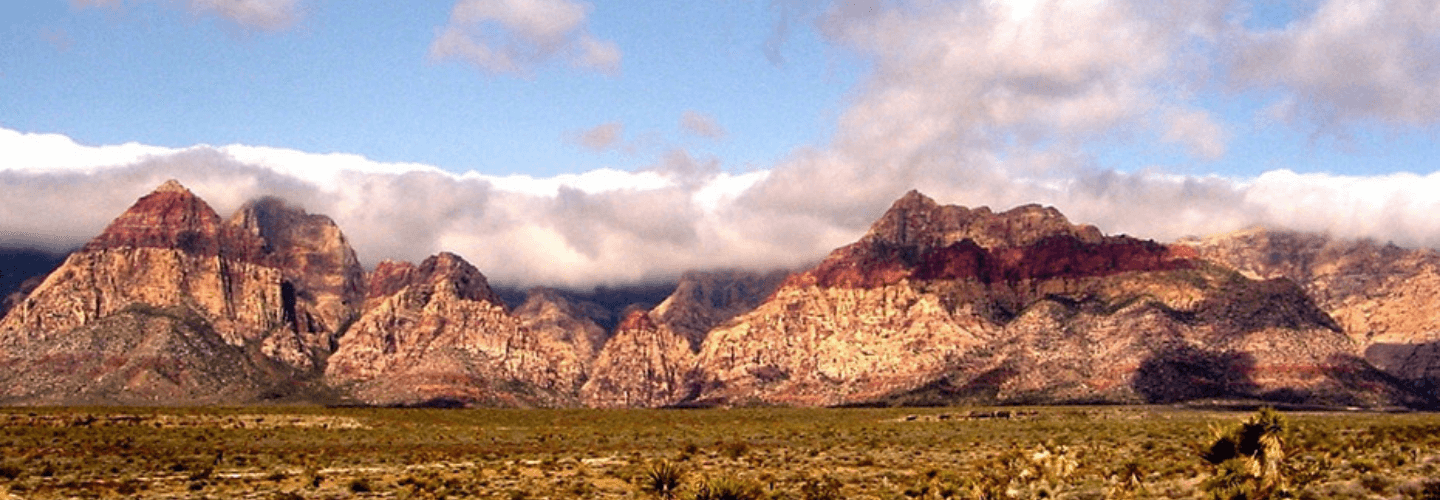Search Results
Search results for 'time to care' (13)

By Conservation Lands Foundation
•
January 6, 2026
FOR IMMEDIATE RELEASE JANUARY 6, 2025 Contact: Kris Deutschman, kris@ conservationlands.org Washington, DC - The bipartisan Fiscal Year 2026 Interior appropriations bill Congress will be considering in the coming days rejects the steep cuts the White House requested for the Bureau of Land Management (BLM) and management of National Conservation Lands, which include nearly 40 million acres of the country’s iconic national monuments, wild and scenic rivers, and other special public lands. The bill provides marginal reductions in funding for the BLM Lands and Resources account, while ensuring funding for the National Conservation Lands system is maintained at $59.135 million, equal to what was enacted in Fiscal Year 2025. Below is a statement from David Feinman, Vice President of Government Affairs of the Conservation Lands Foundation, which represents a national network of community advocates who are solely focused on the public lands overseen by the Bureau of Land Management including National Conservation Lands. "The Conservation Lands Foundation applauds Congress for delivering clear bipartisan, bicameral support for National Conservation Lands and rejecting the White House's proposed 75% cut to the management of these critical public lands. While the current funding is not enough to make up for decades of underinvestment, maintaining the current funding level for the National Conservation Lands system helps the BLM protect these iconic and irreplaceable natural landscapes and the public’s access to them. “We also applaud the inclusion of language in the bill that requires the BLM maintain staffing levels necessary to fulfill its multiple-use mission, including protecting natural and cultural resources, maintaining safe and appropriate access and recreation, conducting Tribal consultation, and managing the National Conservation Lands. “The truth is, BLM and the National Conservation Lands system have been chronically underfunded by Congress and understaffed for decades, and we remain concerned about the historical underinvestment to the nation’s largest public land manager and the conservation lands it stewards. “The agency needs meaningful funding increases to address decades of deferred maintenance, visitor services and resource protection, as well as to properly staff the agency to do this work. Nevertheless, we urge swift passage of the FY26 Interior funding bill, which at minimum provides stability for the agency to fulfill its mission.” ###

By Anna Zawisza
•
July 14, 2025
FOR IMMEDIATE RELEASE CONTACT: Shevawn Bell, shevawn (at) conservationlands.org Washington, DC – The Fiscal Year 2026 Interior appropriations bill introduced in the U.S. House today betrays America’s commitment to public lands and waters by slashing budgets for public land management agencies and blocking the implementation of land management plans shaped by the public. Below is a statement from David Feinman, Vice President of Government Affairs of the Conservation Lands Foundation, on the introduction of this funding package. CLF represents a national network of community advocates who are solely focused on the public lands overseen by the Bureau of Land Management including National Conservation Lands and similar protected public lands in the Western Arctic. “This proposed Interior appropriations bill for Fiscal Year 2026 introduced in the House betrays this country’s decades-long commitment to managing public lands for the use and enjoyment of all Americans. “The House Interior spending bill proposes significant cuts to the Department of the Interior ($61 million below the Fiscal Year 2025 enacted level) and Bureau of Land Management ($110.4 million below the FY2025 enacted level) as well as draconian policy riders that block implementation of critical land management plans that ensure public lands are managed responsibly for all who use them. “These decisions by the House have real world impacts, including risks to public safety, the erosion of visitor services and irreparable harm to cultural and ecological resources on public lands. A well-funded Bureau of Land Management is essential to preserving access, supporting rural economies and ensuring safe and sustainable recreation. “Public lands stewarded by the BLM are growing rapidly in popularity and visitorship, yet Congressional funding for the agency to manage and protect these lands has not kept pace. Adequately funding the BLM is one of the most efficient and effective ways we can prevent wildfires, ensure public access to outdoor recreation and preserve the ecological and cultural values of National Conservation Lands. “The package also prevents the implementation of widely-popular policies like the Public Lands Rule and land management plans shaped by and for the public like the Grand Staircase-Escalante National Monument Resource Management Plan. “This year, we celebrate the 25th anniversary of the National Conservation Lands. On behalf of the millions of Americans across the country who value public lands and waters, we call on Congress to develop and pass a funding bill that invests in America’s public lands, the civil servants who steward them and the processes that ensure their proper management is an essential national priority.”

By Anna Zawisza
•
June 2, 2025
Washington, DC – The Conservation Lands Foundation today condemned the White House Office of Management and Budget’s FY26 budget proposal for the Bureau of Land Management, which delivers devastating cuts that would cripple the agency's ability to steward America's public lands and fulfill its legal mandates. Below is a statement from Chris Hill, CEO of Conservation Lands Foundation: “The White House’s FY26 Bureau of Land Management budget blueprint is the latest assault in this administration's relentless campaign to dismantle public lands and gut the agencies that protect them. By cutting the Lands and Resources account by more than $460 million and slashing the National Monuments and National Conservation Areas account by 72.%, the administration is making it clear that it does not value these irreplaceable public lands and waters, the communities and rural economies that depend on them, the wildlife that calls them home, or their essential role in our climate future. Instead, the White House would rather gut vital programs like the National Conservation Lands to fund tax breaks for billionaires. “The Bureau of Land Management oversees more public land than any other federal agency—245 million acres across the American West—yet has been chronically underfunded and understaffed by Congress for decades. A well-funded BLM is essential to preserving outdoor recreation and public access, supporting rural economies, and safeguarding local watersheds and wildlife, but has been historically underfunded and understaffed. “Now the White House is slashing the National Conservation Lands system to just $15 million - $16.3 million less than the lowest amount Congress has provided in the program's history ($31.301 in FY2010). Since then, the National Conservation Lands system has grown by more than 12 million acres through acts of Congress and Antiquities Act proclamations by presidents of both parties. These staggering budget cuts mean closed trails and visitor centers, damaged wildlife habitats, and forsaken conservation commitments that span generations of bipartisan leadership. “This budget blueprint follows Interior Secretary Doug Burgum's testimony last month before the House and Senate Interior Appropriations Subcommittees, which revealed an administration more interested in extracting short-term profits than protecting our lands, water, wildlife and the public’s access to the outdoors. Despite carefully crafted rhetoric about 'responsible resource management,' the Secretary’s actions tell a different story: this administration prioritizes corporate interests ahead of the American people and future generations. “While we recognize the need to balance the use of public lands with responsible energy development and production of domestic critical minerals, we believe in the longstanding, bipartisan tradition that all activities on public lands must respect outdoor recreation access, environmental laws, the rights and traditions of Indigenous people, and the long-term preservation of the land and essential wildlife habitats that are part of the natural and national legacy that belongs to all of us. “We’re encouraged that lawmakers from both parties support keeping America’s public lands in public hands and we commend Rep. Mike Simpson (R-Idaho), Rep. Chellie Pingree (D-Maine), Sen. Martin Heinrich (D-New Mexico), Sen. Jeff Merkley (D-Oregon), and Sen. Patty Murray (D-Washington) for their statements opposing public land sell-offs in the recent budget hearings. Since the White House refuses to provide the BLM with the resources necessary for the agency to fulfill its responsibilities under the Federal Land Policy and Management Act, Congress must take the lead where the administration has fallen short. “We’re grateful to America’s public lands champions in Congress, including Sen. Jacky Rosen (D-Nevada) and Rep. Dina Titus (D-Nevada), who led letters in the Senate and House of Representatives , respectively, and their 33 colleagues who signed their letters urging appropriators to reject the White House budget request and provide robust funding for the BLM and National Conservation Lands in FY2026. “We call on Congress to reject the administration’s proposal that shortchanges effective stewardship of America’s public lands. Congress must also scrutinize this administration's continued wasteful spending on legally questionable efforts to weaken national monument protections. We will hold Secretary Burgum to his commitment—made to Senator Heinrich—that no monument boundaries will be altered without meaningful local consultation. “America's public lands belong to all of us. Full Stop. Congress has the opportunity—and the responsibility —to ensure these treasures remain protected for current and future generations.” ###

By Anna Zawisza
•
February 11, 2025
Washington, D.C. — Today, the House Natural Resources Federal Lands Subcommittee held a hearing on "Restoring Multiple Use to Revitalize America's Public Lands and Rural Communities,” which spread misinformation in service of an agenda to sell off America's public lands to the wealthy and well-connected – effectively blocking access to regular Americans for hiking, camping, hunting and fishing. Below is a statement from Jocelyn Torres, Chief Conservation Officer of the Conservation Lands Foundation, in response to today’s hearing: “Today's House Natural Resources Federal Lands Subcommittee revealed that they know America doesn’t face an energy crisis that only public lands can solve. Featured witnesses instead spun up a truth crisis and set the table for the biggest public lands sell off in the country’s history. “By presenting outrageous claims about public lands management and popular conservation tools, they are willfully ignoring three facts: the majority of voters overwhelmingly support protecting natural resources on public lands; the U.S. is already the world's largest producer of oil and gas ; and there’s plenty of public lands available for energy development. The country doesn't have to choose between the environment and the economy, and gutting public land protections won’t lower the cost of groceries.” THE FACTS ABOUT AMERICA'S PUBLIC LANDS: Americans Overwhelmingly Support Conservation: 70% of voters across party lines prioritize protecting natural resources on public lands Public Lands Rule Has Massive Public Support: 92% of public comments submitted to the Bureau of Land Management supported the Public Lands Rule Majority of BLM Lands Already Open for Development: Roughly 85% of BLM lands are currently available for oil and gas development, with nearly half of existing leases not being used Northern Corridor Highway Environmental Impact: Scientific analysis confirms the proposed highway through Red Cliffs National Conservation Area in Utah would destroy critical desert tortoise habitat, increase wildfire risk and violate five federal environmental laws Congressional Underfunding Reality: Decades of systematic underfunding by Congress has hampered the Bureau of Land Management’s ability to manage public lands, while Congress criticizes the very problems it created “Members of Congress have a legal and moral obligation to present facts to the American people and to seek meaningful bipartisan solutions for the lands and waters that communities rely on. The Conservation Lands Foundation will continue to advocate for fact-based public land policy that serves all Americans, not just the wealthy few.” ####

By Conservation Lands Foundation
•
July 26, 2024
Washington, D.C. - Conservation Lands Foundation released the following statement in response to the Senate Appropriations Committee markup of the FY25 Interior funding bill and House passage of their own version of that spending bill earlier this week. Statement from David Feinman, Government Affairs Director at Conservation Lands Foundation: “What we’ve seen this week in Congress is two different visions for how 40% of America’s public lands can be managed: the House bill exacerbates decades of staffing and resource deficits and undermines bedrock conservation laws and land use planning processes, while the Senate bill invests in the health of our public lands and the people who do this important work. “The House Interior spending bill, which nearly failed to pass, includes significant cuts to the Department of the Interior and Bureau of Land Management as well as draconian policy riders that undermine the integrity of the Antiquities Act and block implementation of critical plans that ensure these public lands are managed responsibly for all who use them. These decisions by the House have real world impacts, including risks to public safety and irreparable harm to cultural resources on public lands. “The Senate Interior spending bill, on the other hand, which passed 28-1 out of committee, does the exact opposite. While not enough to make up for the decades of underfunding, the Senate bill is a rational recognition that investing in our public lands, the civil servants who steward them, and the processes that ensure their proper management is an essential national priority. “We urge the Congress to move forward with the Senate’s vision for the future of the Bureau of Land Management as they resolve the FY25 Interior spending process, and adequately fund the care of the country’s natural resources that support important recreation areas, wildlife, water sources, and cultural heritage." # # #

By David Feinman
•
August 4, 2023
Today, August 4, 2023, marks the third anniversary of the signing into law of the Great American Outdoors Act , a crucial step forward in providing funding for America’s public lands and outdoor spaces. While the GAOA represented a positive step toward providing essential funding mechanisms for public lands, much more needs to be done to ensure land management agencies have the proper staffing and resources necessary to steward and protect public lands for future generations.

By David Feinman
•
January 27, 2023
Late last year, Congress approved an historic investment for America’s National Conservation Lands in their 2023 appropriations bill, a direct result of collective efforts from supporters like you who made their voices heard about the importance of providing the Bureau of Land Management with more resources to manage our public lands. What are National Conservation Lands? The system of National Conservation Lands, established in 2000, is the newest designation of public land protection that contains some of the nation’s most spectacular landscapes and are managed by the largest caretaker of public lands in America, the Bureau of Land Management.

By Conservation Lands Foundation
•
June 1, 2022
QT Luong is a strong supporter of our mission to protect and expand America’s National Conservation Lands system, including National Monuments. Hear more about his experiences on the land and capturing its beauty in our Community Conversation . 4. For the Busy Parent Busy parents have a lot on their plates this time of year. You can make the season a tad bit easier on them by gifting high-quality winter accessories from Patagonia for their kids. Every parent knows you can never have enough of those lying around.

By Conservation Lands Foundation
•
May 18, 2022
Congress recently passed the Fiscal Year 2022 Appropriations bill with $49 million for the Bureau of Land Management (BLM) to care for and manage National Conservation Lands. That’s a 7.5% increase in funding from the previous year! While this funding is a step forward, it’s still not enough. We’re asking Congress to provide at least $78 million in Fiscal Year 2023 for the BLM to manage National Conservation Lands so that future generations can enjoy these beloved places. Will you urge your Senators to join us in this effort? It takes just a few minutes!

By Tanaya Winder
•
June 25, 2021
We have some exciting updates in our Time to Care Campaign! The letter below was sent on June 24, 2021 to the Senate Appropriations Subcommittee on Interior, Environment, and Related Agencies' Chair and Ranking Member advocating for proper funding to manage and support National Conservation Lands. Thank you to Senator Jacky Rosen (NV) for leading this request for increased funding for our National Conservation Lands in the FY22 Interior appropriations bill. And, thanks to Senator Alex Padilla (CA), Senator Dianne Feinstein (CA), Senator Michael F. Bennet (CO), Senator Catherine Cortez Masto (NV), Senator Ron Wyden (OR), and Senator Bernie Sanders (VT) for your leadership in supporting the protection and management of our beloved lands for generations to come.






